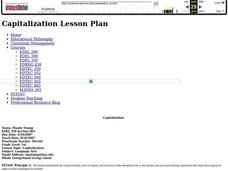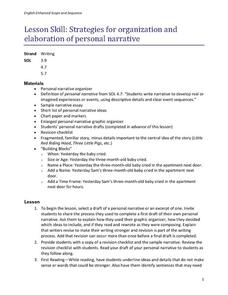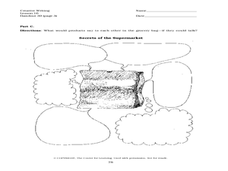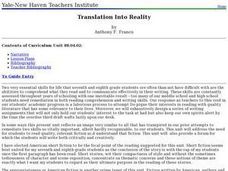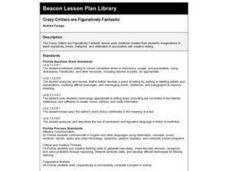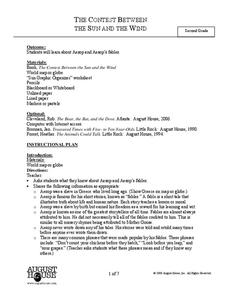Curated OER
"Spelldown" by Becky Mushko
Learners read Spelldown, by Becky Mushko and consider how it portrays the Appalachian community. They define and discuss vocabulary presented in the story and write a comparison/contrast paper analyzing two of the story's characters. The...
Curated OER
Flying Freudian Fun: A Look At Ethical Decision Making
There are not many more apt examples of ethics gone awry than William Golding's Lord of the Flies.. Ninth graders focus the ethics of decision making with the examples provided in the plot. They focus on the concept of the psyche and how...
Novelinks
The Color of Water: Word Square Instructions
Immaculate, accumulation, dissipation. Vocabulary drawn from chapter 16 of James McBride's memoir, The Color of Water, can prove to be challenge for readers. To help kids understand the meaning of these words and what they add to the...
Curated OER
Capitalization
Teach your class the rules of capitalization with this fun, engaging lesson plan. Children participate in a learning activity, collaborate with peers, and practice their writing as they learn three specific rules: to always capitalize...
Curated OER
The Mastodon Kill
Using the book Bandits, Bears, and Backaches, learners develop an understanding of the pre-history of Arkansas. They follow the trail ofthe giants mastodons and paleo Indians who lived there long ago. The emphasis on this lesson is on...
Novelinks
Sense and Sensibility: Anticipation Guide Reading Strategy
Begin your discussion about Jane Austen's Sense and Sensibility before you even open the book. Kids fill in a worksheet that lists five statements about the literary themes of the novel, and then discuss their opinions as a group. Once...
Curated OER
The Study of Theme and Figurative Language in Poetry and/or Prose
Identify and analyze the use of figurative language used in select pieces of writing. These pieces of literature will represent at least two pieces by one writer and at least two pieces by different writers. This lesson would be a great...
Curated OER
Regarding the Fountain: Questioning Strategy—Cubing
Look deeper into the text with a reading strategy based on asking critical thinking questions. While reading Reading the Fountain by Kate Klise, learners think of questions that help them describe, compare, associate, analyze, apply, and...
Bantam Books
The Tempest: Chalk Talk
Discussion doesn't always need to be spoken. Before you begin The Tempest by William Shakespeare, have kids connect their ideas and experiences to central questions of the play with a silent discussion activity. Once they have...
Curated OER
Rhetorical Devices in a Primary Source
Analyze Martin Luther King Jr.'s famous and powerful "I Have a Dream" speech as a primary source document. After reading up on rhetorical devices and working in small groups to define terms, class members identify and explain the use of...
Curated OER
Silly Nilly
Fourth graders create their own stories with a life instructional activity and illustrate them.
Curated OER
Strategies for Organization and Elaboration of Personal Narrative
Personal narrative writing is usually a favorite form of writing for youngsters because they get to write about a personal experience. The lesson here asks pupils to take a piece of narrative writing and improve it by following...
Alabama Learning Exchange
Systems Every "Body" Needs to Know
Through an informative WebQuest and group work, learners explore the human body and cell structure. They create a cell diagram, research a disease, write a letter explaining the causes of human disease, and work in small groups to create...
Curated OER
Primary Songs about Recycling
Students compose songs about recycling. In this ecology lesson, students use vocabulary and concepts related to recycling to generate lyrics for an original song. Students construct musical instruments out of discarded materials.
Curated OER
The Verbal Sketch
Young scholars use perspective observation sketches to understand verbal description. In this subjective writing lesson plan, students practice writing subjective conversations using the cartoon worksheets.
Curated OER
Translation Into Reality
Students read a variety of short stories that focus on teenage protagonists. In groups, they answer comprehension questions and discuss the characters and setting for each story. Individually, they choose one writing assignment to...
Curated OER
All Quiet On The Western Front
Students create a poem on the subject of war. In this All Quiet on the Western Front activity, students create poetry using phrases or lines that they brainstorm during a pre-writing session. Students enhance their poetry with sensory...
Curated OER
Crazy Critters are Figuratively Fantastic
Eighth graders use creatures created from their imaginations to practice hyperbole, simile, metaphor, and alliteration in association with creative writing. They utilize a worksheet imbedded in this plan to guide their writing.
Curated OER
An Unfinished Tale...
Challenge your writers to compose a proper ending for the short story "The Talisman." Class members start out by either listening to or reading the first nine paragraphs of the story. The rest is up to them! Encourage kids to resolve the...
Curated OER
Message in a Bottle
Sixth graders write a short story about being stranded on a deserted island. After a brief geography review of locations at various latitudes and longitudes, 6th graders draft their story about being stranded. They use sensory and...
Curated OER
The "Real" Fairy Tales
Students write a Fairy Tale from the point of view of the "bad guy".
Curated OER
The Contest Between The Sun And The Wind
Second graders read fables by Aesop and learn about the famous storyteller. In this fables lesson plan, 2nd graders discuss questions about Aesop and then write their own fable.
Curated OER
Rainbow Fish
Students listen to a story about tropical fish and view photographs. Using a piece of construction paper, they draw a fish and add eyes, a mouth and fins. They also add colorful scales to make the fish their own and place it into the...
Curated OER
An Encyclo-ME-dia for Every Child
Students create a digital scrapbook that shows information-text and pictures that are specific to each child. They make charts and graphs. They use digital cameras, scanners, software, to write captions, stories, poems, letters, and...





